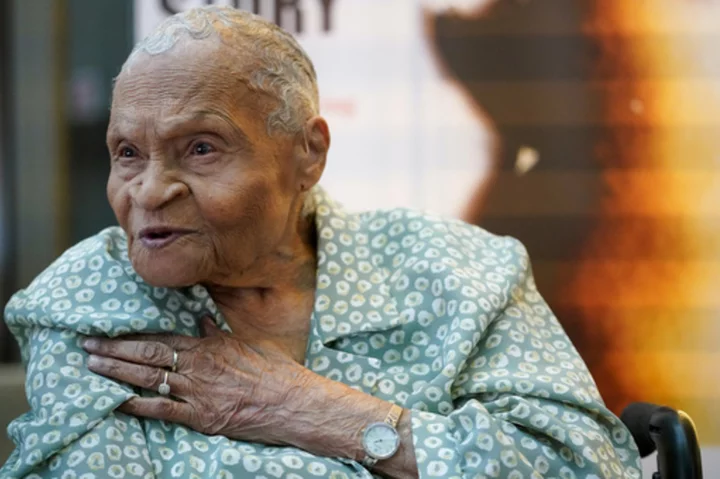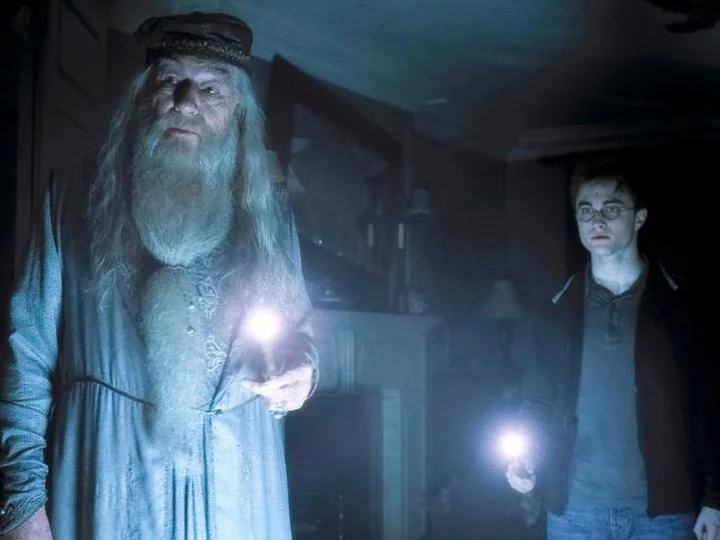NEW YORK (AP) — Being a centenarian hasn’t slowed down Viola Ford Fletcher’s pursuit of justice.
In the last couple of years, Fletcher has traveled internationally, testified before Congress and supported a lawsuit for reparations — all part of a campaign for accountability over the massacre that destroyed Tulsa, Oklahoma’s original “Black Wall Street” in 1921, when she was a child.
Now, at age 109, Fletcher is releasing a memoir about the life she lived in the shadow of the massacre, after a white mob laid waste to the once-thriving Black enclave known as Greenwood. The book will be published by Mocha Media Inc. on Tuesday and becomes widely available for purchase on Aug. 15.
In a recent interview with The Associated Press, she said fear of reprisal for speaking out had influenced years of near-silence about the massacre.
“Now that I’m an old lady, there’s nothing else to talk about,” Fletcher said. “We decided to do a book about it and maybe that would help.”
Her memoir, “Don’t Let Them Bury My Story,” is a call to action for readers to pursue truth, justice and reconciliation no matter how long it takes. Written with graphic details of the 1921 Tulsa Race Massacre that she witnessed at age seven, Fletcher said she hoped to preserve a narrative of events that was nearly lost to a lack of acknowledgement from mainstream historians and political leaders.
“The questions I had then remain to this day,” Fletcher writes in the book. “How could you just give a mob of violent, crazed, racist people a bunch of deadly weapons and allow them — no, encourage them — to go out and kill innocent Black folks and demolish a whole community?”
“As it turns out, we were victims of a lie,” she writes.
Tensions between Tulsa’s Black and white residents inflamed when, on May 31, 1921, the white-owned Tulsa Tribune published a sensationalized news report of an alleged assault by a 19-year-old Black shoeshine on a 17-year-old white girl working as an elevator operator.
With the shoeshine under arrest, a Black militia gathered at a local jail to prevent a lynch mob from kidnapping and murdering him. Then, a separate violent clash between Black and white residents sparked an all-out war.
Over 18 hours, between May 31 and June 1, the enlarged mob carried out a scorched-earth campaign against Greenwood. The death toll has been estimated to be as high as 300. More than 35 city blocks were leveled, an estimated 191 businesses were destroyed, and roughly 10,000 Black residents were displaced.
In her memoir, Fletcher writes of the bumpy ride out of town in a horse-drawn buggy, as her family escaped the chaos. She witnessed a Black man being executed, his head exploded like “a watermelon dropped off the rooftop of a barn."
The shooter had also fired his shotgun at her family’s buggy.
“We passed piles of dead bodies heaped in the streets,” she writes in the book. “Some of them had their eyes open, as though they were still alive, but they weren’t.”
Victims’ descendants believed that, once the conspiracy of silence around it was pierced decades later, justice and reparations for Tulsa’s Black community would follow. That hasn't happened just yet — Fletcher and two other centenarian survivors are currently plaintiffs in a lawsuit against the city of Tulsa.
Ike Howard, Fletcher’s grandson and co-author of the memoir, said systemic racism has prevented Tulsa’s Black community from fully recovering from the massacre.
“They want to be made whole,” Howard said. “We speak for everybody that went through a similar situation, who are not here to tell their stories.”
“You can learn a lot from ‘Don’t Let Them Bury My Story.’ And we know that history can repeat itself if you don’t correct and reconcile issues,” he added.
Fletcher notes in her memoir just how much history she has lived through — from several virus outbreaks preceding the coronavirus pandemic, to the Great Depression of 1929 and the Great Recession of 2008 to every war and international conflict of the last seven decades. She has watched the Rev. Martin Luther King, Jr. lead the national Civil Rights Movement, seen the historic election of former President Barack Obama and witnessed the rise of the Black Lives Matter movement.
In 2020, Howard purchased his grandmother a brand new color TV for her birthday. Several months later, on Jan. 6, the images of the mob attack on the U.S. Capitol following the historic election of President Joe Biden and Vice President Kamala Harris retraumatized her.
“With that horrific scene, all of what occurred back in 1921 in Greenwood came flooding back into my mind,” Fletcher writes in the book.
In the AP interview, Fletcher attributed her active lifestyle at an advanced age to her reliance on faith and family. While in New York last month to publicize the book with Howard and her younger brother, 102-year-old Hughes Van Ellis, Fletcher saw the cover of her memoir advertised on jumbo screens in Times Square.
Van Ellis, a massacre survivor and World War II veteran whose words from his 2021 testimony to Congress serve as the foreword to his sister’s memoir, said he believes justice is possible in his lifetime.
“We’re getting pretty close (to justice), but we aren’t close enough,” he said. “We’ve got a lot more work to do. I have to keep on battling. I’m fighting for myself and my people.”
___
Aaron Morrison is a member of AP’s Race and Ethnicity team. Follow him on Twitter: https://www.twitter.com/aaronlmorrison.









